AWM41 1054 - [Nurses Narratives] Sister E Vickers Foote - Part 3
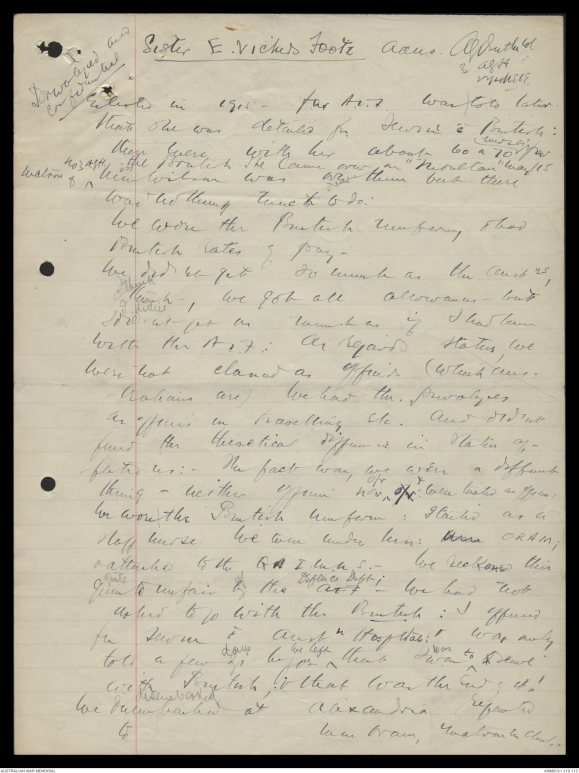
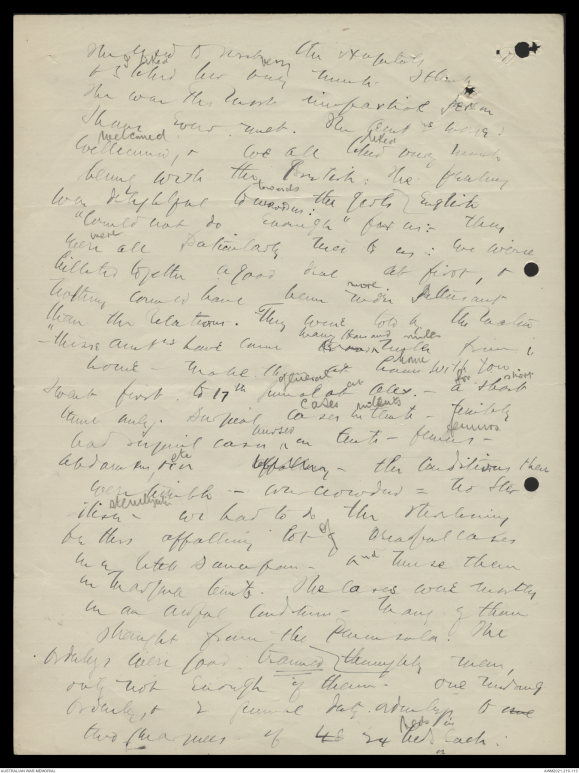
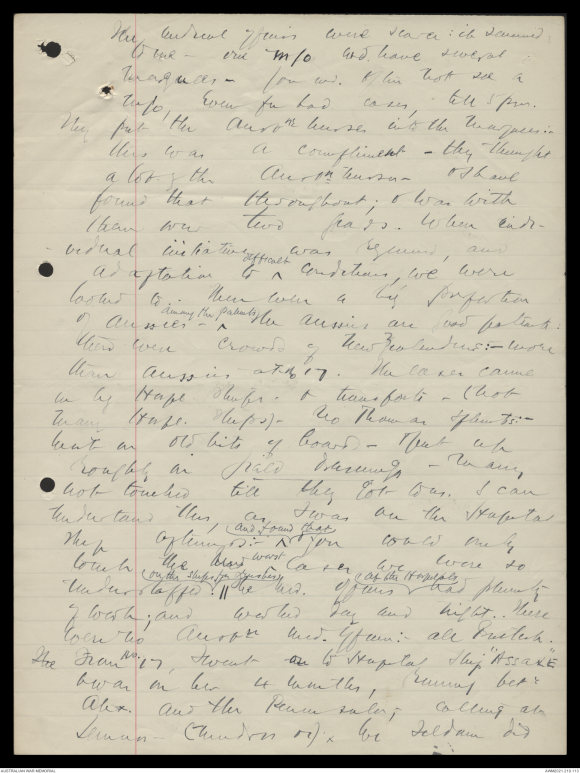
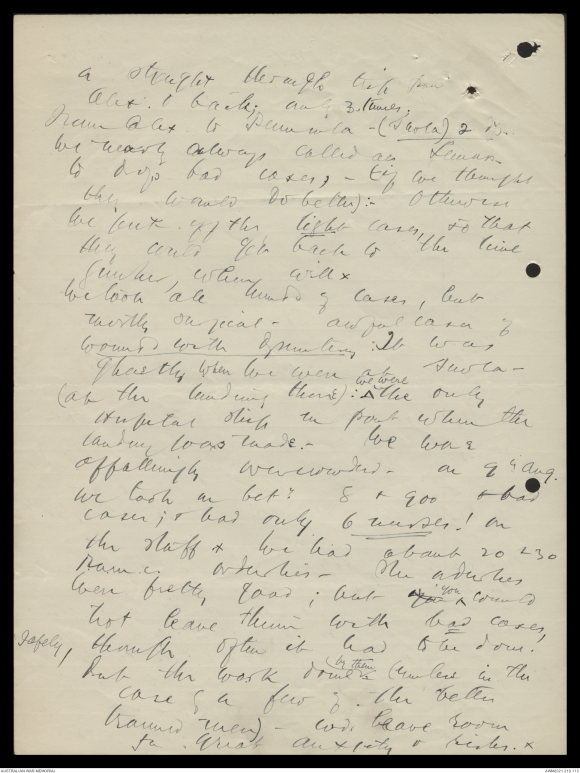
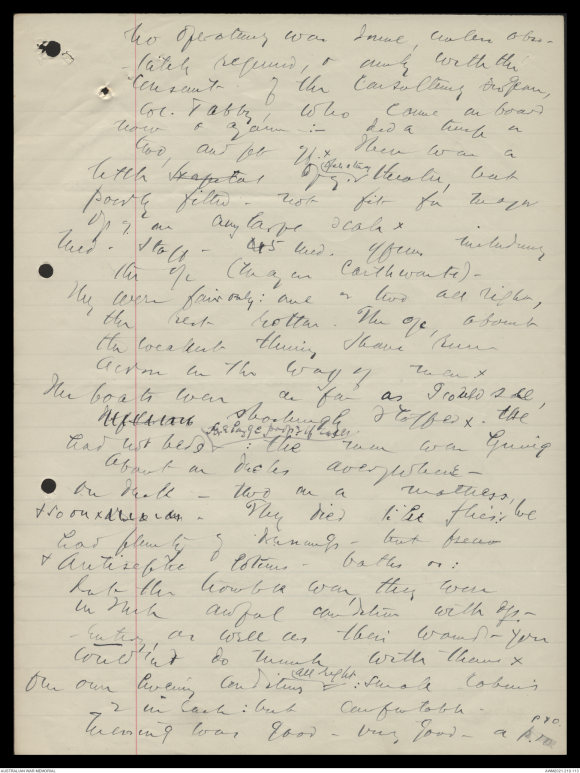
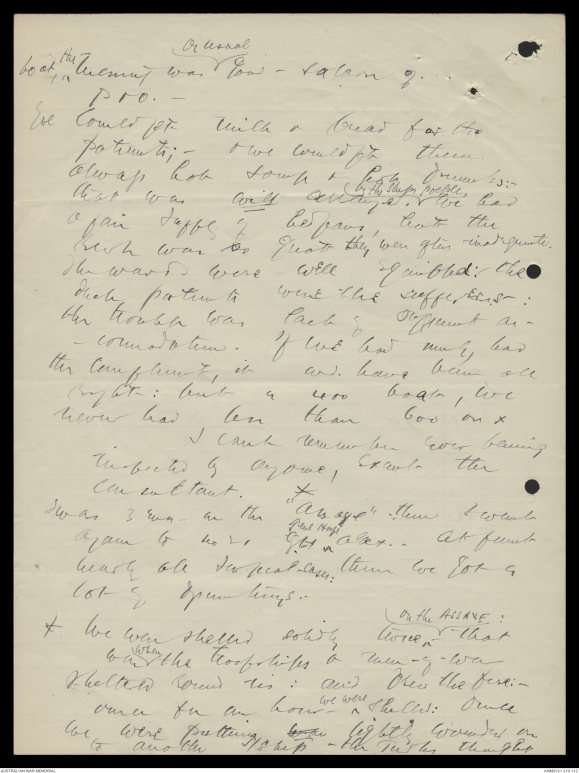
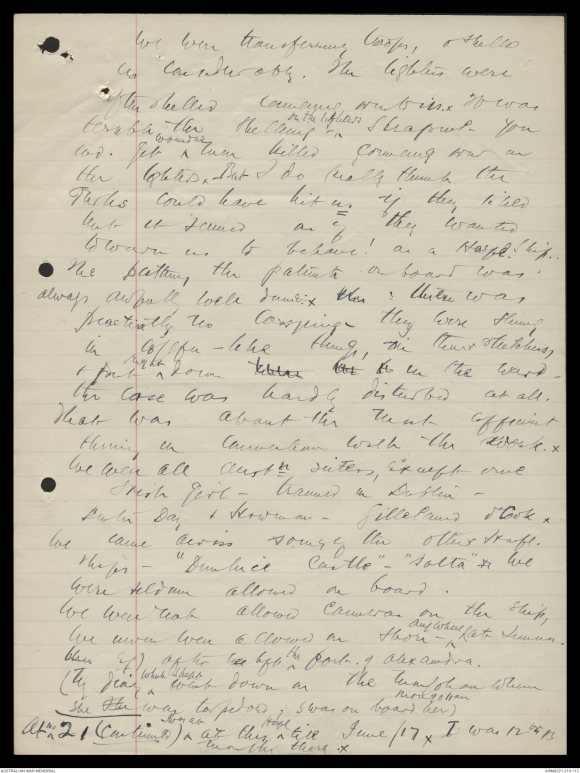
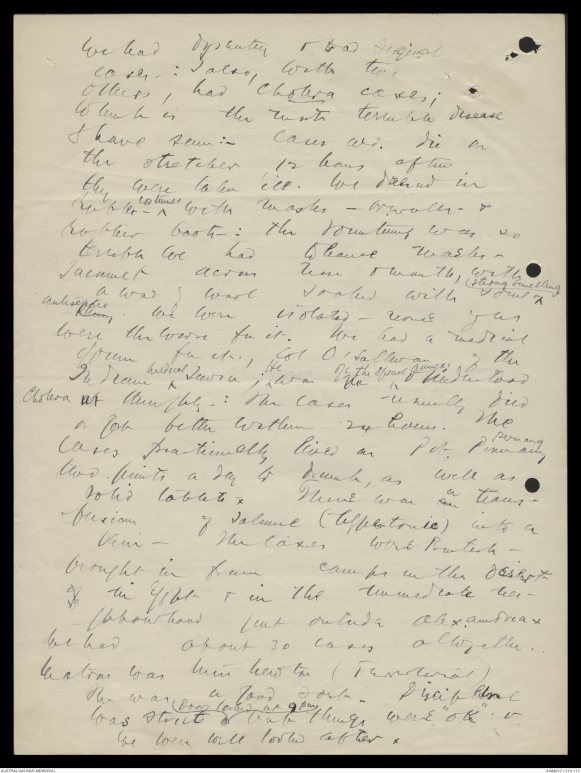
Privileged and Confidential
Sister E. Vickers Foote A A N S
[[*AG Butler Col
3 AGH
[[?]]*]]
Earlier in 1915 - for A.I.F. wants to later
that she was detailed for service c̄ British:
there were with her about 60 or 70 ^nurses
the British. She came over on "Mooltan" May/15
Matron of ^No 3 A.G.H. [[?]] Wilson was [[?]] there but there
was nothing much to do.
We wore the British Uniform, & had
British rates of pay.
We didn't get as much as the Austns,
[[I think?]] [[?]], we got all allowances but
did not get a [[?]] as if I had been
with the A.I.F. As regards status, we
were not classed as officers (which Australians
are) We had the privileges
as officers in travelling etc. And didn't
[[?]] the theoretical difference in status [[?]]
[[?]] us:- The fact was, we were a different
thing - neither officer nor O/r & were treated as officer.
We wore the British uniform: I started as a
Staff Nurse. We were then under [[?]] ORAM;
& attached to the G A I M N S -We reckoned this
quite unfair by the AIF Defence Dept. - We had not
[[?]] to go with the British: I offered
to serve c̄ Austn Hospitals: was only
told a few days before ^we left that I was ^to serve
with British, & that was the end ofit!
We disembarked at Alexandria reported
to [[??]], [[?]] [[?]]
They used to [[?]] [[?]] [[?]]
& stated her only trunk. I think
The war Miss Oram impartial person
I have ever met. The Aust [[?]]
welcomed, & we all [[?]] very [[?]]
being with the British. The [[feeling?]]
was delightful towards the girls /English
"Could not do enough" for us. They
were all particularly nice to us; we were
billeted together a good deal at first, &
nothing could have been more [[?]]
than the [[relations?]]. They were told by the Matron
"these Austns have come many thousand miles from
home - Make them at home with you.
I went first to 17th General at Alex. - a short
time only. Surgical cases ^nursed in tents - femurs serious
abdomen & etc. xxxx - The conditions there
were terrible - over crowded - No sterilizer -
we had to do the sterilising
for this appalling lot of dreadful cases
in a little saucepan - and nurse them in
in marquee tents. The cases were mostly
in an awful condition - Many of them straight
from the Peninsula. The
orderleys were good trained thoroughly men,
only not enough of them. One nursing
orderley, & 2 general duty orderleys to xx
two marquees of 48 24 beds in each.
There medical officers were scarce it seemed
to me - one M.O wd have several
marquees - You wd often not see a
MO, even for bad cases, till 5 pm.
They put the Austn nurses into the marquees
This was a compliment. They thought a lot of the
Austn nurses & have
found that throughout; & was with
them over two years. When individual
initiative was required, and
adaption to ∧difficult conditions, we were
looked to. There were a big proportion
of Aussies ∧among the patients. The Aussies were good patients.
There were crowds of New Zealanders :- more
than Aussies, at No. 17. The cases came
in by Hospl. Ships & transports (not
many Hospl. Ships). No Thomas Splints
limbs, or old bits of board - & put up
roughly in field dressings. - Many,
not touched till they got to us. I can
understand this as I was on the Hospital
Ship afterwards :- ∧and found that you could only
touch the ∧very worst cases. We were to
understaffed ∧on the ship for rushes. The Med. Officers ∧at the Hospitals had plenty
of work; and worked day and night. There
were no Austn Med .Officers :- all British.
From No. 17, I went on to Hospital Ship "ASSAYE"
& was on her for 4 months, running bet.
Alex. and the Penninsular; calling at
Lemnos (Mudros etc.). We seldom did
a straight through trip from
Alex. & back, only 3 times
from Alex to Penninsula - (Suvla) 2 days
we nearly always called at Lemnos
to drop bad cases, - (if we thought
they would do better) :- Otherwise
we put off the light cases, so that
they could get back to the line
quicker, when well.
We took all kinds of cases but
mostly surgical - Awful cases of
wounds with Dysentery. It was
ghastly when we were at Suvla -
(at the landing there) ∧but were the only
Hospital Ship in port when the
landing was made. - We were
appallingly overcrowded. On 9th Aug.
we took on bet. 8 or 900 & bad
cases; & had only 6 nurses! on
the staff we had about 20 or 30
RAMC orderlies - The orderlies
were pretty good; but xx ∧you could
not leave them with bad cases,
though often it had to be done!
But the work done ∧by them (unless in the
case of a few of the better
trained men) wd leave room
for great anxiety & risks.
No operations were done unless absolutely
required, & only with the
consent of the Consulting Surgeion
Col. Tubby, who came on board
now & again in :- did a trip or
two, and got off. There was a
little operating theatre, but
poorly filled. not fit for major
op. on any large scale.
Med. Staff - 4 or 5 Med Officers including
the O/C (Major Carthwaite).
They were fair only: one or two all right,
the rest rotten. The O/C about
the weakest thing I have run
across in the way of men.
The boats were as far as I could see
xxxxxxxxxx shockingly staffed. We
had no beds ∧for a large proportion of cases : the men were lying
about on decks everywhere -
on [[?]] - two to a mattress
& so on. xxxx They died like flies :- we
had plenty of dressings - but fewer
& antiseptic lotions, baths etc.
but the trouble was they were
in such awful condition with
Dysentery, as well as their wounds. You
could'nt do much with them.
Our own living conditions ∧all right : small cabins
2 in each: but comfortable
Messing was good - very good - a P. & O
.PTO
boat ∧the messing was ∧as usual good - Saloon of
P. & O. -
We could get milk and bread for the
patients; - we could get them
always hot soup & hot drinks :-
that was well arranged ∧by the Ships people. We had
a fair supply of bedpans, but the
rush was so great they were often inadequate.
The Wards were well equipped :- the
deck patients were the sufferers :
the trouble was lack of sufficient
accommodation. If we only had
the compliment it wd have been all
right : but a 400 boat, we
never had less than 600 on.
I can't remember ever being
inspected by anyone, except the
Consultant.
I was 3 months on the "Assaye" then I went
again to No.21 GH ∧Genl Hosp Alex. At first
nearly all surgical cases : ( then we got a
lot of Dysenteries.
We were shelled solidly twice ∧on the ASSAYE that
when the troopships & men-of-war
sheltered round us : and drew the fire :-
once for an hour ∧we were shelled : Once
we were putting xxxx lightly wounded on
to another ship - the Turks thought
we were transferring troops, & shelled
us considerably. The lighters were
often shelled coming over to us. It was
terrible the shelling ∧on the lighters. Shrapnel,
you wd get ∧wounded men killed coming over on
the lighters. But I do really think the
Turks could have hit us if they liked
but it seemed as if they wanted
to warn us to behave! as a Hospl. Ship
The putting the patients on board was
always awfully well done. xxxx There was
practically no carrying they were slung
in coffin-like things, in their stretchers
& put ∧right down in the ward.
The cases was hardly disturbed at all.
That was about the most efficient
thing in connection with the work.
We were all Austn sisters, except one
Irish girl - trained in Dublin -
Sisters Day, Howman, Gillebrand O'Cook
We came across some other Hospl.
ships - "Dunluce Castle" - "Salta" We
were seldom allowed on board.
We were not allowed cameras on the ship.
We never were allowed on shore - ∧anywhere (Lemnos
etc) after we left ∧the port of Alexandria.
(My diary ∧which I kept went down on the Mongolian
She xxx was torpedoed, I was on board her)
At No. 21 (continued) [[?]] at this ∧Hospl till June/17. I was
12 or 13 months there.
We had Dysentery & bad surgical
cases : I also with two
others, had Cholera cases;
which is the worst terrible disease
I have seen :- Cases would die on
their stretcher 12 hours after
they were taken ill. We dressed in
rubber ∧costumes with masks - overalls - &
rubber boots - : The vomiting was so
terrible we had to have masks -
Jacanet across nose and mouth, with
a wad of wool soaked with ∧strong smelling
Antiseptic. [[?]] We were isolated - none
of us
were the worst for it. We had a Medical
[[?]] for it, Col. O'Sullivan of the
Indian ∧Medical Service, ∧He was the ∧O/C the Special Annexe, & understood
Cholera xxx thoroughly: the cases usually died
or got better within 24 hours. The
cases particularly lived on Pot. Permang
two pints a day to drink as well as
solid tablets. There was a transfusion
of Saline (Hypertonic) into a
vein - the cases were British -
brought in from camps in the desert
of in Egypt & in the immediate neighbourhood
went outside Alexandria.
We had about 30 cases altogether.
Matron was Miss Newton (Territorial)
She was a good sort. Discipline
was strict ∧Doors locked at 9 p.m. but things were "OK" &
we were well looked after.
 Sam scott
Sam scottThis transcription item is now locked to you for editing. To release the lock either Save your changes or Cancel.
This lock will be automatically released after 60 minutes of inactivity.